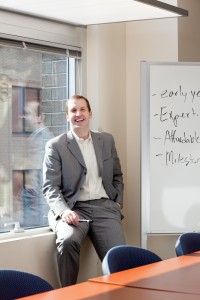Angel Eyes: MBAs view entrepreneurship through an angel investor lens
 Entrepreneurs count on angel investors to provide seed-stage start-up funding, but very few entrepreneurship students ever get to set foot in an angel group as a member.
Entrepreneurs count on angel investors to provide seed-stage start-up funding, but very few entrepreneurship students ever get to set foot in an angel group as a member.
Enter CIE’s new MBA course: Angel Investing. Taught by Rob Wiltbank, the Foster School’s Neal Dempsey Visiting Professor of Entrepreneurship and associate professor of strategy and entrepreneurship at Willamette University, Angel Investing is a year-long course in which second-year MBAs learn about investing by participating as members in Seattle angel groups and making actual investments.
Wiltbank launched the course at Willamette University three years ago, and the class was recently included in Inc. Magazine’s list of the top 10 entrepreneurship courses in the country. But Wiltbank has long-standing ties to the University of Washington and Seattle. He earned his PhD in strategic management from the UW Foster School in 2005 and is a partner at Montlake Capital.
The class is clearly a departure from other MBA courses. “One of the good things about being in school is that you learn how things should be done. One of the bad things is that you don’t get to do them,” says Mark Partridge, a second-year MBA in the class. “It’s rare that you get actual experience doing something as extraordinary as angel investing.”
“It’s a great integration program,” says Wiltbank, who has students in Seattle’s Alliance of Angels, Puget Sound Venture Club, Northwest Energy Angels, Seraph, WINGS, and Keiretsu Forum. “Students watch and evaluate pitches, identify potential investment opportunities, and perform extensive due diligence.” Ultimately, the class will make two or three $25,000 to $50,000 investments in promising start-ups.
Sound exciting? Definitely! Sound easy? Definitely not. “There’s a vertical learning curve,” admits Wiltbank. “Much of the content is unfamiliar, and students who excel in this course must be true entrepreneurs—self-motivated, with a willingness to put themselves out there.”
Students spend the year with a group of intelligent, savvy investors. After the course, they will know a great pitch when they see one, and those who become entrepreneurs will know what investors are looking for. “Their ability to pitch is dramatically enhanced,” says Wiltbank, adding that having this experience on their resume will make graduates very desirable to future employers. In an interview, he insists, “it’s the ultimate closer.”
Mark Partridge is just one quarter into the course, but he agrees that the experience he is gaining is an investment in his future. As for whether it will help him close on a future job, he smiles. “I’ll let you know.”
